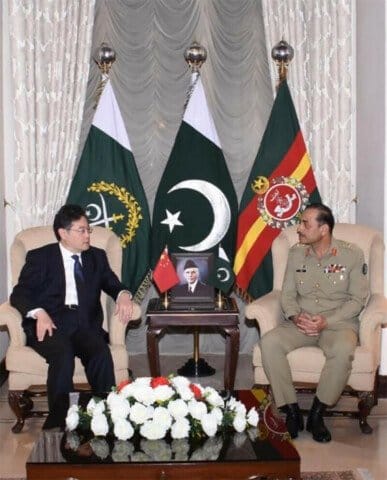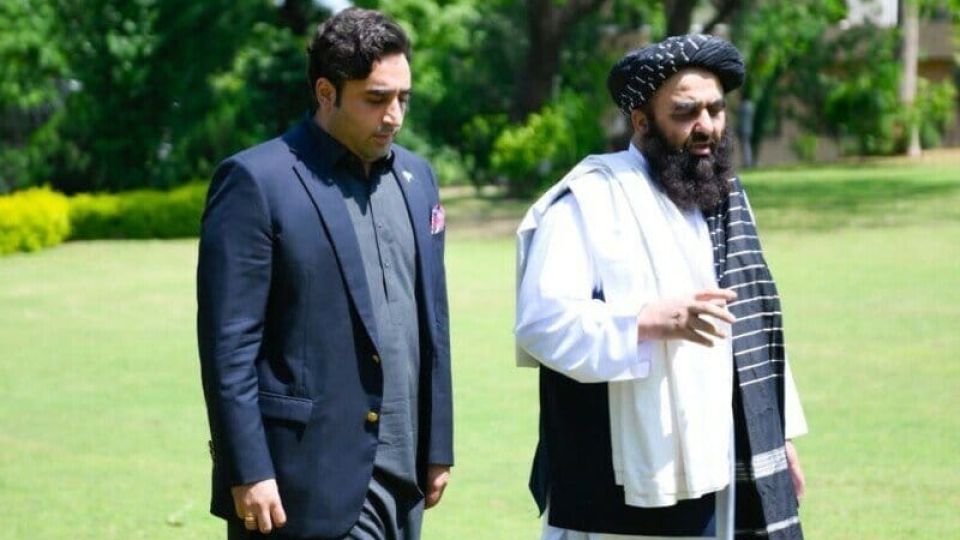May 8, 2023
ISLAMABAD – Foreign Minister Bilawal Bhutto Zardari and his Afghan counterpart on Sunday emphasised the need for “enhanced coordination to counter terrorism and deepening bilateral cooperation”, according to a press release from the Foreign Office (FO).
Acting Afghan Foreign Minister Amir Khan Muttaqi is currently in Pakistan on a four-day visit to participate in bilateral and trilateral meetings. FM Bilawal welcomed him earlier in the day at the Ministry of Foreign Affairs in Islamabad.
پاک افغانستان مذاکرات /اسلام آباد
پاکستان اور افغانستان کے درمیان وفود کی سطح پر
وزیر خارجہ بلاول بھٹو زرداری نے افغان وزیر خارجہ مولوی امیر خان متقی کی قیادت میں افغان وفد کا دفتر خارجہ آمد پر استقبال کیا
وزرائے خارجہ کی سربراہی میں وفودکی سطح پر مذکرات ہو ئے
پاکستان… pic.twitter.com/vCE1lhS73l
— PTV News (@PTVNewsOfficial) May 7, 2023
The FO statement said the two sides held a “candid and in-depth exchange” on key issues of mutual concern, including peace and security, as well as trade and connectivity.
“The foreign ministers reaffirmed their desire to pursue continuous and practical engagement,” the FO said, adding that they also stressed the importance of removing impediments to trade in order to advance the goal of enhanced regional economic integration and connectivity.
Pictures shared by the foreign minister’s account also showed State Minister for Foreign Affairs Hina Rabbani Khar present during the meetings.
🔊: PR NO. 8️⃣6️⃣/2️⃣0️⃣2️⃣3️⃣
Foreign Minister hosts Acting Afghan Foreign Minister at Ministry of Foreign Affairs
🔗⬇️https://t.co/Fe7Kbxwuga pic.twitter.com/EMeh05YXuB
— Spokesperson 🇵🇰 MoFA (@ForeignOfficePk) May 7, 2023
FM Bilawal said he was “pleased” to host his Afghan counterpart and held a comprehensive discussion on all areas of mutual importance.
“Pakistan is committed to enhance bilateral relations in a spirit of cooperation, trust and respect,” he said.
Pleased to host Acting Afghan FM Mawlawi Amir Khan Muttaqi @FMMuttaqi at MoFA today. Held comprehensive discussion on all areas of mutual importance, incl. security, trade & connectivity matters. 🇵🇰 is committed to enhance bilat. rel. in a spirit of co-operation, trust & respect pic.twitter.com/EfkbsulXGc
— BilawalBhuttoZardari (@BBhuttoZardari) May 7, 2023
Bilawal said he also underscored the importance of “frequent leadership-level exchanges to provide further stimulus” to bilateral relations.
Had a frank and candid exchange on wide ranging issues of mutual interest with Acting Afghan FM @FMMuttaqi @ForeignOfficePk today. Underscored the importance of frequent leadership level exchanges to provide further stimulus to Pakistan-Afghanistan bilateral relations. pic.twitter.com/aHotxKQLhN
— BilawalBhuttoZardari (@BBhuttoZardari) May 7, 2023
Earlier today, FM Bilawal said it was an honour to host the foreign ministers of China and Afghanistan at the 5th China-Pak-Afghan Trilateral FMs Dialogue.
“We held productive discussions on political engagement, counter-terrorism, trade, and connectivity,” he said. “I look forward to constructive engagement under a trilateral process between our three countries.”
It was an honor to host FMs of China & Afg & Chair the 5th China-Pak-Afghan Trilateral FMs Dialogue. We held productive discussions on pol. engagement, counter terrorism, & trade & connectivity. I look forward to constructive engagement under trilat. process b/w our 3 countries pic.twitter.com/n2t0dSxaBe
— BilawalBhuttoZardari (@BBhuttoZardari) May 7, 2023
Since its launch in 2017, the trilateral dialogue mechanism has become an important platform for the three countries to enhance understanding and deepen mutual trust and cooperation. The dialogue this time took place at a time when cross-border attacks from Afghanistan are on the rise.
Prime Minister Shehbaz Sharif also said the trilateral dialogue underscored the “unwavering consensus of Pakistan and China to work for a peaceful, stable and prosperous Afghanistan in the interest of Afghan people”.
Unlocking economic potential of the region remains contingent on restoration of regional peace and stability. The 5th Trilateral Foreign Ministers' Dialogue held in Islamabad yesterday underscores the unwavering consensus of Pakistan and China to work for a peaceful, stable &…
— Shehbaz Sharif (@CMShehbaz) May 7, 2023
At the “productive” trilateral talks on Saturday, Pakistan and China had assured Afghanistan of their cooperation so that the conflict-torn country begins its journey towards stability.
FM Bilawal and his Chinese and Afghan counterparts had held productive discussions on matters of mutual interest, including political engagement, counter-terrorism, trade and connectivity.
The trilateral dialogue was followed by the 4th round of Sino-Pak strategic dialogue.
Bilawal, while speaking at a joint stakeout with Qin after the strategic dialogue, had stressed that peace and stability in Afghanistan remained vital for the socio-economic development, connectivity and prosperity of the region.
“We will continue to work together with all stakeholders for peaceful, stable, prosperous and united Afghanistan,” he had said.
The foreign minister had said engagement with the Afghan authorities was a must and it was their consistent message to them to “help us help you”.
He had said unlocking Afghanistan’s potential was crucial for the benefit of its people, and that achieving stability and peace in the country was essential.
Bilawal had said the core issue and red line was terrorism, which posed a serious threat to regional peace and was a stumbling block in the way of prosperity for the Afghan people.
He had said that during his recent Shanghai Cooperation Organisation’s (SCO) Council of Foreign Ministers meetings in India, they had discussed different projects within the framework of SCO including CASA, Trans-Afghan railways, but all these projects hinged upon addressing the security issues in Afghanistan.
Tolo news reported that FM Muttaqi had also held a meeting with politicians in Islamabad on Saturday where the participants stressed the need for “nations and governments” of the two countries to be closer and for free travel between countries to be facilitated.
Jamiat Ulema-i-Islam-Fazl Emir Maulana Fazlur Rehman and Jamaat-e-Islami Emir Sirajul Haq were part of the meeting as well.
Acting Foreign Minister Amir Khan Muttaqi held a meeting with political leaders in Islamabad on Saturday night, a spokesman for the Foreign Ministry said, adding that the participants stressed the need for “nations and governments” of the two countries to be closer and for free… pic.twitter.com/Ub36AN353o
— TOLOnews (@TOLOnews) May 7, 2023
COAS meets FM Muttaqi, Chinese FM
Chief of Army Staff (COAS) Gen Asim Munir had also met FM Muttaqi on Saturday and stressed the need for enhanced cooperation between the two countries to “effectively tackle the common challenges of terrorism and extremism”.
According to a statement issued by the Inter-Services Public Relations (ISPR) late on Saturday, Muttaqi called on the army chief at his office.
The statement said the two had discussed issues of mutual interest, including aspects related to regional security, border management, and formalisation of bilateral security mechanisms for “improvement in the current security environment”.
“COAS stressed the need for enhanced cooperation between the two brotherly neighbours to effectively tackle the common challenges of terrorism and extremism. He reiterated the need for full support and commitment from the Afghan interim government in matters of mutual interest,” the ISPR had said, adding that the COAS also reaffirmed “Pakistan’s commitment to a stable, peaceful and prosperous Afghanistan”.
The statement added that the Afghan minister had appreciated Pakistan’s support for the people of Afghanistan and acknowledged the “important role that Pakistan continues to play in facilitating peace and development in Afghanistan”.
Muttaqi had also expressed his desire to work closely with Pakistan to promote regional stability and prosperity, it added.
Both sides had agreed on the importance of maintaining regular contact to strengthen bilateral ties and address issues of common concern.
Separately, COAS Munir had also met with Qin Gang, China’s state councillor and foreign minister.
“Matters of mutual interest, including regional security and defence cooperation, came under discussion,” the ISPR had said in a statement.
During the meeting, the army chief had reaffirmed Pakistan’s commitment to the China-Pakistan strategic relationship. COAS Munir had also pledged full support for the China-Pakistan Economic Corridor (CPEC) project and appreciated Beijing’s unwavering support for Pakistan on regional and international issues, the statement said.
Meanwhile, the Chinese minister had underscored the importance of the longstanding strategic relationship between the two countries and expressed satisfaction over CPEC’s progress while reiterating his country’s commitment to its timely completion.
“He also appreciated Pakistan’s efforts in maintaining regional peace and stability, especially the support of Pakistan’s armed forces for the provision of security to Chinese nationals and projects in Pakistan,” the ISPR had said.
The two dignitaries had also discussed the evolving security situation in the region.
The army chief had acknowledged China’s role in promoting peace and stability in the region, and both sides agreed to enhance their existing cooperation in defence and security domains to effectively counter common security challenges, the statement said.
“The meeting concluded on a positive note, with both sides reiterating their resolve to further strengthen the time-tested, all-weather friendship between Pakistan and China,” the ISPR had said.

Chinese Foreign Minister Qin Gang in a meeting with Chief of Army Staff Gen Asim Munir on Saturday.—ISPR


